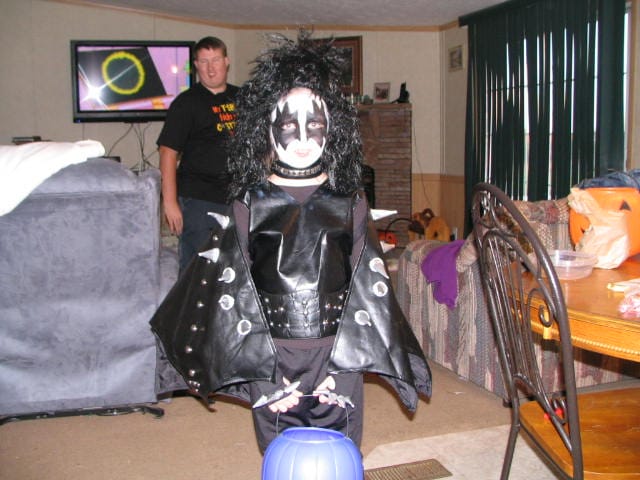For anyone born in the early 2000s, you may have heard the phrase "rock is dead" muttered by a parent or seen it commented on a music festival lineup. Or, like me, heard it a few too many times from people wearing Five Finger Death Punch shirts. I mean, we missed out on iconic bands like The Beatles, KISS, Metallica, Nirvana, and so many more in their prime. It seems like we missed out on the "good rock." But, did it really die before we even got a chance to see it? Surely we didn't drive the final nail in rock's coffin. Despite what the media thinks, I truly believe that, as the title says, rock is far from being laid to rest. If you look closely, you will see it has just redefined itself and rebranded, like it has done so many times before.
I am a rock fan, through and through. From having over 100s of vinyl to the tattoos that are etched into my skin, I couldn't imagine a life without music. The whole reason I even got into writing in the first place is because of the movie Almost Famous. But, back in December of 2024, I felt conflicted seeing Gene Simmons of KISS fame, who was an idol to young Beau, talk about how he sees rock as dead. I was reminded of that feeling I had when I read this editorial prompt. I immediately knew this was the piece for me. Being as integrated into rock as I am, it kind of hurts to think of it as dead or being snuffed out. So I needed to find a reason to have hope in this genre and the artists within it. And of course, to prove people wrong.

Listening to the Music
To understand the rebranding of rock, we need to acknowledge the change in how we consume music today. We live in a world where digital streaming platforms, such as Spotify and YouTube Music, dominate the industry. Paired with TikTok sharing music, new and old, to a wider audience, music as a whole is more accessible than ever. The shift in music consumption doesn't just influence how we discover artists, but also how artists make the music. Hearing more genres and styles, they take the essence of rock and infuse it with influences from hip-hop, pop, and electronic music. For rock to stay relevant as a genre, it has to change its sound. That is just business.
Bands like Greta Van Fleet and Royal Blood are great examples of modern bands ingraining classic rock's signature sound while still appealing to a new generation of listeners.
Greta Van Fleet, with their powerful vocals and guitar riffs reminiscent of iconic 70s rock, evokes the sound of legends like Led Zeppelin. Their music feels both nostalgic and fresh, making it relatable to those who appreciate the roots of rock and roll, as well as appealing to newer fans who might not have been exposed to that era.
On the other side is Royal Blood, who blends a heavier, more modern "rock" sound with the more traditional influences. Their dynamic bass lines and energetic drumming create a raw, gritty vibe that resonates with listeners seeking a more intense sound of rock. This approach allows them to maintain the classic rock spirit while incorporating modern elements, ensuring they stay relevant in today’s ever changing music scene.
The Underground
I have found many bands that are keeping the rock genre alive and breathing today— they just aren’t the mainstream. Which, to some, isn't a bad thing. Many underground bands produce music that resonates with audiences who are seeking authenticity and relatability. This is why the underground rock scene is where new fans are flocking to the most. I have witnessed it myself. Many people in my generation crave the charm old rock possessed and the access the fans had to the bands. A lot of us lean towards the smaller underground scenes because it echoes even the smallest part of what rock once was. This explains why the media doesn't see the impact of rock today on our society because a lot of it is in these small venues or house shows. Just because mainstream radio doesn't prominently feature these artists or cover the scene, it doesn’t mean they don’t exist or aren’t making an impact on the world.
The Curtain Call
Media and fans have been saying that this genre we love and care for, has been dead for ages. You can even trace this to the 50s (and probably even earlier if you dig hard enough). The day of February 3rd, 1959 was when some of the biggest names in rock died. The deaths of Buddy Holly, Richie Valens, and J.P. Richardson, all on the same day, went on to be called "The Day The Music Died."
Another example is the emergence of punk to the mainstream coming from The Sex Pistols in the late 1970s. Their raw, anti-establishment style, lead to people declaring the decline of rock once again.
The term "dead" gets slapped onto rock anytime there is a death of an icon or a shift in the sound. But at its core, rock was meant to be an ever-evolving genre. The roots of rock came from the blending of sounds and people. Most notably: blues, R&B, gospel, jazz, and country music. The genre also came out at a turning point in history. It resonated deeply with the youth who still had war fresh on their minds. It gave an identity to them, a change of style, and a change in attitude. Something so deeply rooted in society and what is happening at the time is going to change, to rebrand, or change its sound. Whatever the world wants to say, rock will echo its message.



